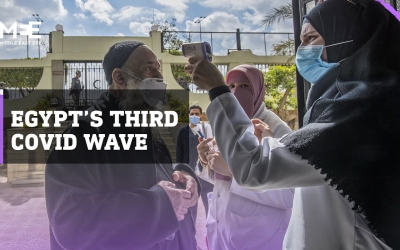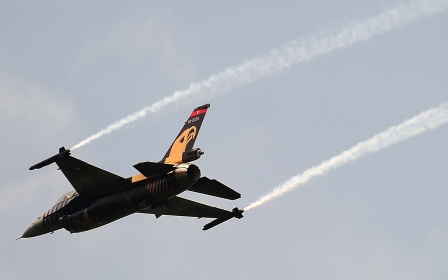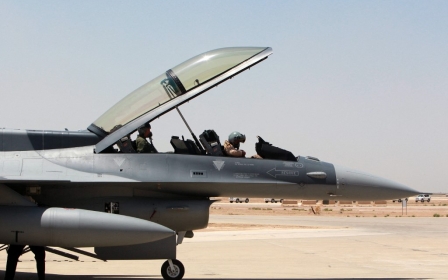Iraq: Fire at Covid-19 hospital in Baghdad kills at least 82
At least 82 people were killed and 110 injured in a fire on Saturday at a hospital in southeastern Baghdad that had been equipped to house Covid-19 patients, medical sources at three nearby hospitals told Reuters.
The fire at the Ibn Khatib hospital in the Diyala Bridge area of the Iraqi capital occurred after an accident caused an oxygen tank to explode, the sources said.
The blaze spread quickly, according to the civil defence, as "the hospital had no fire protection system, and false ceilings allowed the flames to spread to highly flammable products".
'It is a crime against patients exhausted by Covid-19 who put their lives in the hands of the health ministry'
- Iraqi government's Human Rights Commission
Many ambulances were rushing towards the hospital, ferrying away those hurt by the fire, a Reuters photographer nearby said.
Patients not injured in the incident were also being transferred out of the hospital, the medical sources said.
The head of the Iraqi civil defence unit said the fire broke out in the floor designated for the pulmonary intensive care unit and that 90 people had been rescued from the hospital out of 120, state news agency INA quoted him as saying.
Major General Kadhim Bohan added that the fire had been put out.
Videos on social media showed firefighters trying to extinguish flames at the hospital, as patients and their relatives sought to flee the building.
The incident sparked outrage online, and Iraqi Prime Minister Mustafa al-Kadhimi ordered an investigation into the incident in the early hours of Sunday.
Later on Sunday, Khadhimi suspended the minister of health pending investigations, AFP reported.
Several victims' families were still at the hospital hours after the fire had been put out, having been unable to locate them elsewhere.
Translation: Explosion of oxygen tank in Al-Khatib Hospital in Baghdad, and reports of injuries and deaths.
An eyewitness who was visiting his brother when the fire broke out described people jumping out of windows as the fire spread quickly throughout the unit equipped to house Covid-19 patients.
Patients' relatives scrambled to save their loved ones.
"In the beginning, there was an explosion... The fire spread like fuel," said a relative of one of the patients who was there at the time of the explosion.
"The smoke reached my brother. My brother is sick. I took my brother out to the street. Then I came [back]... to the last floor that did not burn. I found a girl suffocating, about 19 years old, she was suffocating, she was about to die.
"I took her on my shoulders and I ran down. People were jumping... Doctors fell on the cars. Everyone was jumping. And I kept going up from there, got people and came down again."
Poor health system
Iraq's healthcare system, already ruined by decades of sanctions, war and neglect, has been stretched during the coronavirus crisis.
The fire, which according to several sources was caused by negligence, often linked to endemic corruption in Iraq, immediately sparked anger on social media in the country, with a hashtag demanding the health minister be sacked trending on Twitter.
Baghdad Governor Mohammed Jaber called on the health ministry "to establish a commission of enquiry so that those who did not do their jobs may be brought to justice".
In a statement, the government's human rights commission said the incident was "a crime against patients exhausted by Covid-19 who put their lives in the hands of the health ministry and its institutions and instead of being treated, perished in flames".
The commission called on Kadhemi to fire Health Minister Hassan al-Tamimi and "bring him to justice".
Kadhemi responded by calling for "an immediate investigation with those in charge at the ministry" and demanded that the "hospital director, head of security and the technical maintenance team be sent to the investigators and not be released until those at fault have been brought to justice".
He also declared three days of national mourning.
'There is a shortage in funding emergency operations in hospitals, while civil defence workers are elderly or unqualified, because the state does not pay sufficient attention to that sector'
- Diaa Al-Hindi, Karbala Health Directorate
Ali al-Bayati, a member of Iraqi High Commission for Human Rights, held the health ministry responsible for the incident, accusing it of failing to cooperate with investigators.
"I think the responsibility of the incident is on the Ministry of Health, as we have evidence that most hospitals have no occupational safety or firefighting facilities, and it is not the first case in such an institution," he told Middle East Eye.
"Unfortunately, the health ministry did not cooperate with us to investigate the incident, and that is against the IHCHR law number 53 in 2008, which states that all official directorates should facilitate our work," Bayati said.
Hussein Ali, a Baghdad resident whose mother died in the blaze, told MEE: "I feel so sad that I brought my mother to recover from Covid, but she passed away in the fire. I have no words to describe what I feel, what other people feel. What is happening reflects the fragile health system and corrupt parties who have run the country for 18 years."
"The resignation of the health minister and other politicians is not enough. Holding them to account and bringing them to justice is the minimum," said Ali, adding: "Kadhemi will compensate us with money, but can money bring back my mother's soul?"
Diaa al-Hindi, a candidate for the next elections, said the health system had been deteriorating since the US invasion of 2003.
Hindi, who also works at the inspection department in Karbala Health Directorate, said the state does not pay attention to the civil defence sector, which led to its decay.
"Fire alarm systems are not available in most hospitals, and what is available is not working," he told MEE.
"There is a shortage in funding emergency operations in hospitals, while civil defence workers are elderly or unqualified, because the state does not pay sufficient attention to that sector," he said.
On Wednesday, the number of Covid-19 cases in Iraq surpassed one million, the highest of any Arab state.
The health ministry has recorded 15,217 deaths since the country's first infections were reported in February 2020. It has said it carries out around 40,000 tests daily from a population of 40 million.
Those patients who can often prefer to source oxygen tanks for treatment at home rather than go to overcrowded and run-down hospitals.
The country launched its vaccination campaign last month, and has received nearly 650,000 doses of different vaccines, the majority by donation or through the Covax programme, which is helping lower- and middle-income nations to procure vaccines.
As of Wednesday, 274,343 people had received at least one dose, the ministry said.
Health authorities have faced an uphill battle to convince Iraqis to get vaccinated in the face of widespread scepticism over the jab and public reluctance to wear masks since the start of the pandemic.
Middle East Eye propose une couverture et une analyse indépendantes et incomparables du Moyen-Orient, de l’Afrique du Nord et d’autres régions du monde. Pour en savoir plus sur la reprise de ce contenu et les frais qui s’appliquent, veuillez remplir ce formulaire [en anglais]. Pour en savoir plus sur MEE, cliquez ici [en anglais].





